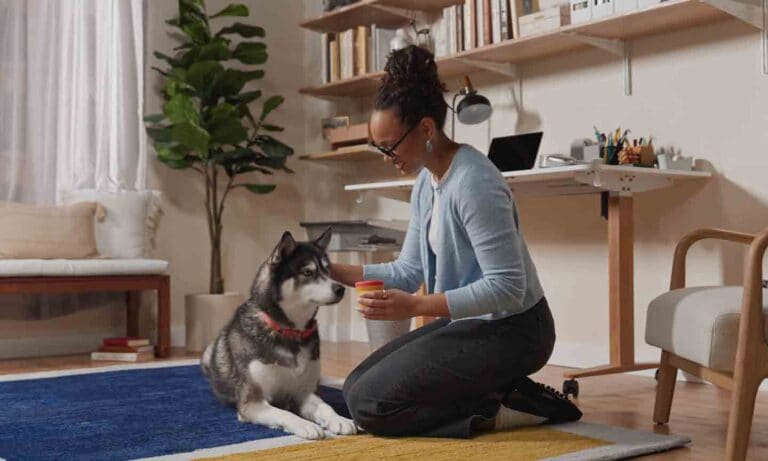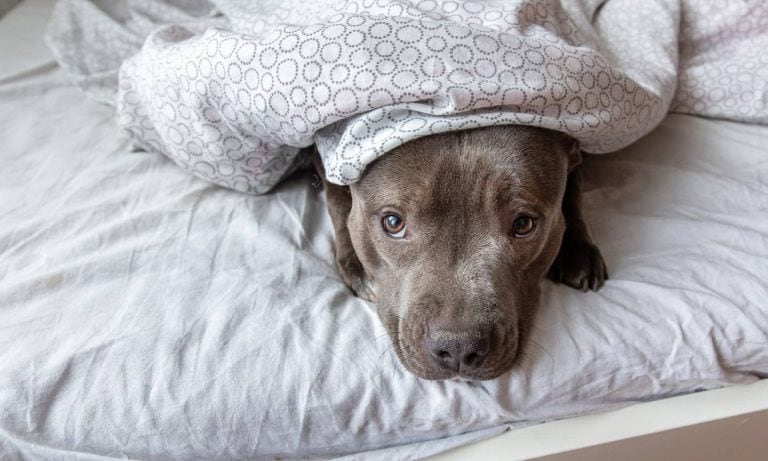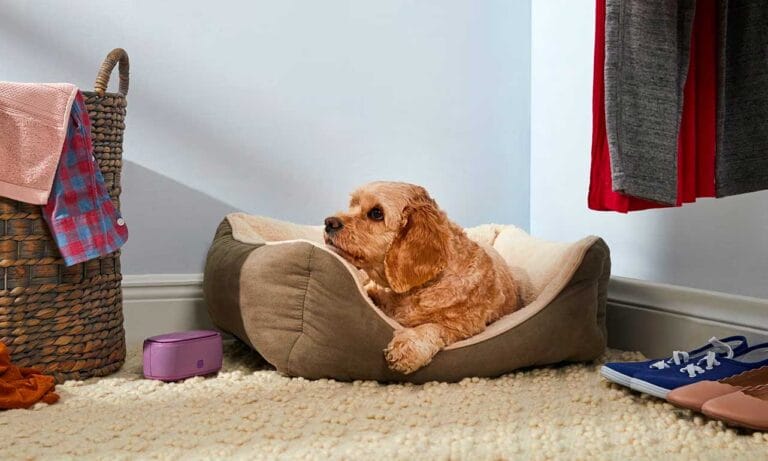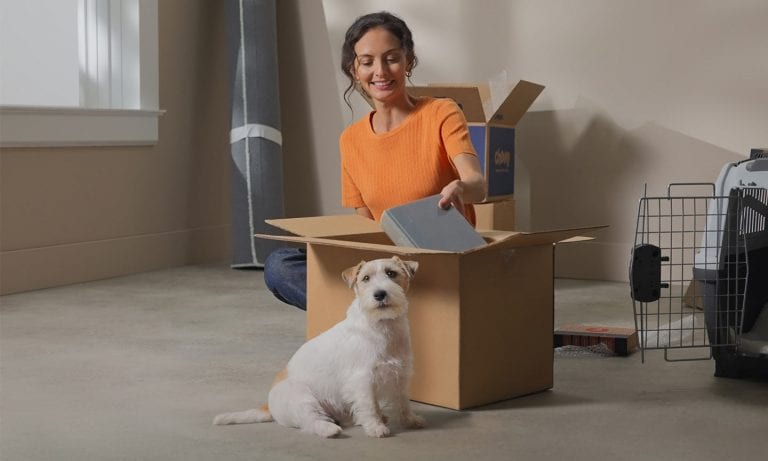If you’re experiencing separation anxiety from your dog or cat, we’re here to tell you that you’re not alone. Getting to spend almost 24/7 with our fur babies has definitely been the silver lining of 2020. But after months of constant companionship, you might be feeling a little more stressed out than usual when leaving your dog or cat at home. As pet parents head back to work or finally get away for some much-needed R&R, it’s normal to feel anxious.
To help you get through it, we talked to a couple of therapists to get their advice on recognizing the signs of separation anxiety from your dog or cat and how to cope.
Wait—What Is Separation Anxiety? And Can Pet Parents Really Suffer From It?
So, what exactly is separation anxiety? Separation anxiety is the “excessive fear or worry concerning separation from the person or pet that we are attached to,” according to Alyssa Hickey, LCSW, a licensed clinical social worker at Therapeutic Oasis in Jupiter, Florida.
And during the pandemic, many pet parents have gotten even more attached to their pets—so it’s become more common for people to experience separation anxiety when they’re away from them, explains Sherry Amatenstein, LCSW, a New York City-based therapist, author and advisory board member for Psycom, a top 3 mental health site in the U.S.
“Our pets provide emotional support, comfort and joy,” says Hickey. “With COVID-19, we have all grown used to the comfort we receive from our pets. Not only is it stressful to re-integrate into a COVID-19 world, but we are now leaving a big coping skill at home.”
OK, So What Are the Signs of Separation Anxiety from Pets?
Amatenstein says the signs of separation anxiety from pets vary widely. It can be as minor as constantly missing your pet while at work to more serious behaviors—like not wanting to leave home without your pet by your side or panicking when you do.
“Symptoms can include guilt, making excuses to stay home, difficulty focusing when away from your pet, distress and worry about your pet or about a possible catastrophe,” Hickey says.
How to Cope with Separation Anxiety from Pets
If you think you’re experiencing separation anxiety from your dog or cat, Hickey and Amatenstein have simple suggestions.
Practice Being Away from Your Pet
As difficult as it might be to do, Hickey suggests practicing being away from your pet for small bursts of time, which she says can help you manage your separation anxiety when you eventually return to your in-office 9-5.
If you’ve been spending most of your time at home, try running a few errands in short increments, like 20 or 30 minutes at a time. Then, gradually increase the time away from your pet, ensuring that they are comfortable with the time apart, too.
Buy a Pet Camera
Install a pet camera, suggests Hickey, so you can check in on your furry friend. Some pet cameras—like the Pawbo+ Wi-Fi Interactive Pet Camera—even come with a treat dispenser, so you can show them some love even when you’re not at home.
Swipe through Photos and Videos of Your Fur Baby
Like any good pet parent, your phone is probably full of cute pictures and videos of your fur kid. Whenever you’re feeling anxious, try swiping through your camera roll and remembering how excited you’ll both be when you get home. “You can bring them with you figuratively with pictures or videos,” says Hickey.
Research Caregivers Like Groomers, Pet-Sitters, Etc.
Amatenstein says if your anxiety feels more related to your dog or cat being left alone, you can help relieve some of that stress by thoroughly researching who will be caring for your pet while you’re away and reading reviews from recent customers. And it never hurts to ask for recommendations from fellow pet parents. They trust them with their own pets, after all!
Try One of These Toys for Stressed-out Humans
Stress toys help focus your attention on something else like solving a puzzle, or release tension by squeezing a rubber ball and temporarily get your mind off missing your pet. Plus, they’re fun!
See some of our favorite stress toys for people (and their pets, too!) here.
Pets Can Get Separation Anxiety, Too
Just like their humans, pets can get separation anxiety, too. Watch for these signs of stress in pets, like loss of appetite, accidents in the home, panting, excessive shedding or destructive behavior.
Helping Your Pet Cope with Separation Anxiety
If your pet is displaying any of the above symptoms, be sure to give your vet a call. They might recommend one of the following remedies.
- Practice being apart: Just like leaving your pet for short periods of time can help you, it can also help your pet get used to you being away and reduce potential separation anxiety, says Dr. Rachel Barrack, DVM, CVA, CVCH, owner of Animal Acupuncture in New York City. “Try and get them used to the routine,” she says. “If they seem anxious, you can leave them with their favorite toy or a KONG with frozen wet dog food or peanut butter, or sprinkle a few kibbles around to keep them occupied and distracted. You can also try leaving the TV on or playing soothing music.”
- Go through your leaving-home routine—but stay: If your pet’s anxiety is triggered by you grabbing your keys or coat, do it several times throughout the day at random, but when you won’t actually be leaving, suggests Shawna Garner, DVM, U.S. Lead Veterinarian for digital veterinary< clinic FirstVet. “This will help your [pet] learn that your keys and coat are not always associated with leaving,” she says.
- Enroll your pup in doggy daycare: For some pups, the company and activities offered at doggy daycare can help keep their mind off the fact that their human isn’t with them. Courtney D. McWilliams, MSW, founded MaryMac’s Doggie Retreat in New Orleans, Louisiana, specifically to help dogs with anxiety. “We provide a more structured day for daycare by offering enrichment activities designed to stimulate the mind,” says McWilliams.
- Talk to your vet about calming supplements: Calming supplements, that often boast potentially stress-reducing ingredients like melatonin, can be helpful for mild cases of separation anxiety, says veterinary behavior consultant Rolan Tripp, DVM, CABC. Talk to your vet about supplements like ThunderWunders Melatonin Calming Dog Chews that uses melatonin to help nervous pups relax, or Zesty Paws Hemp Elements Calming Nutrastix that support dental health while providing reportedly calming ingredients like hemp seed.
Learn more about separation anxiety in dogs here.
Learn more about separation anxiety in cats here.
When to Call Your Doctor—or Veterinarian
If you’re experiencing separation anxiety to the point where it seems to be affecting your quality of life, consider calling your doctor. They can help get to the root of the issue and advise treatment.
“If you are struggling to regularly leave your pet and experience multiple of the above symptoms, you may need a professional to better understand your anxiety,” says Hickey.
And the same goes for your pet. If you’re worried, it’s always best to call your vet to schedule an appointment to discuss your pet’s symptoms.
Share:












